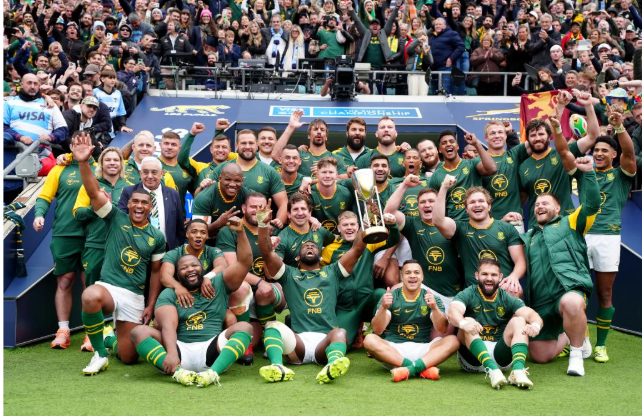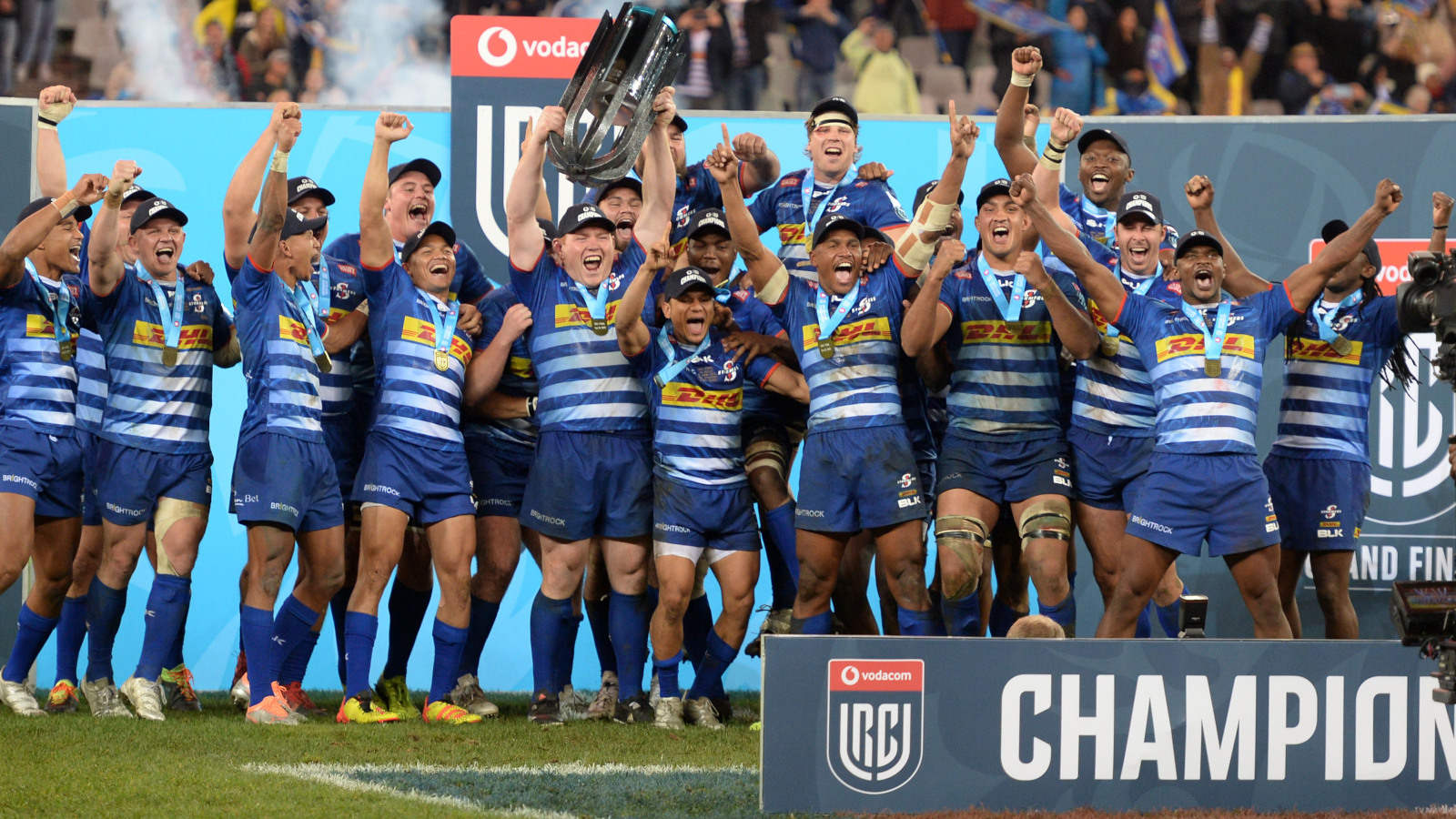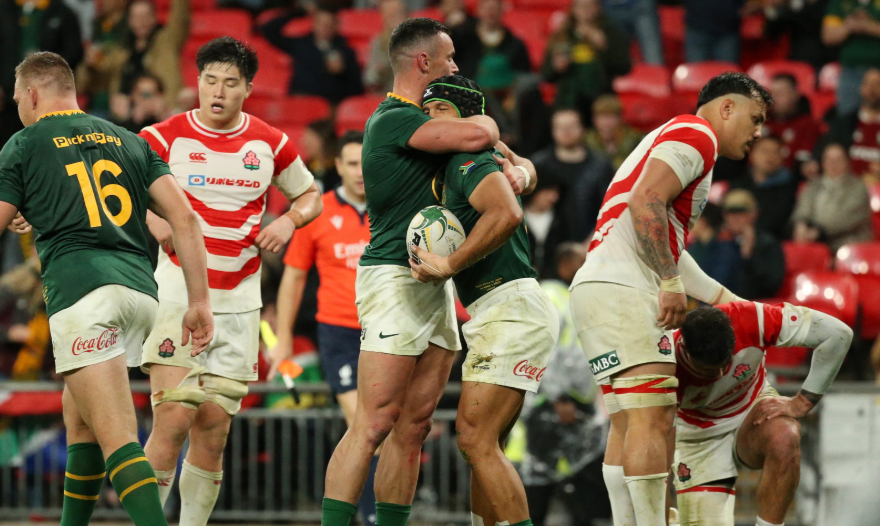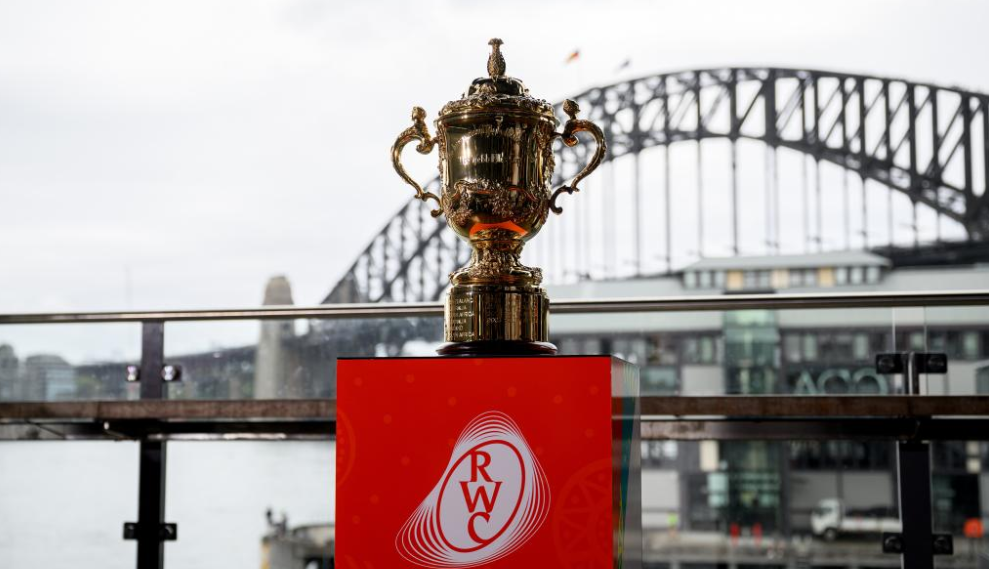For the first time in the professional era, the Springboks have carried their World Cup-winning momentum into the seasons that follow – a seismic shift from the post-1995, 2007, and 2019 hangovers that once defined South African rugby.
The Post-World Cup Curse Is Finally Broken
For nearly three decades, the Springboks had a strange rhythm. Every four years, they would climb the mountain, plant the flag, and then promptly stumble down the other side, glass of champagne still in hand. Glory was followed by drift. World Cup triumphs were followed by chaos, inconsistency, or complacency. The pattern was so entrenched it became part of South African rugby folklore: Win the Cup. Take a nap. Wake up three years later in a panic.
Not anymore. Post-2023, the Boks are doing something they’ve never quite managed in the modern era: they’re staying good. Not just competitive, not just “in transition” – genuinely, consistently world-class. The 2025 Rugby Championship has underlined that this isn’t a honeymoon phase; it’s a new standard. And to understand just how significant that is, we need to revisit the ghosts of hangovers past.

1995: Glory, Then Drift
The fairytale of 1995 was as iconic as it gets: Mandela, Pienaar, the nation united, the Webb Ellis lifted on home soil. But in the years that followed, the Springboks’ on-field trajectory mirrored South Africa’s messy rugby transition into professionalism.
There was no clear high-performance structure, no settled coaching vision, and political interference was rampant. Kitch Christie stepped down due to illness, and Andre Markgraaff and Carel du Plessis followed in rapid succession. By 1998, the team had a new coach seemingly every season. The World Champions lost their edge almost immediately.
The Boks still won games – they weren’t a disaster – but they lacked cohesion and planning. By the time the 1999 World Cup rolled around, the Springboks were scrapping for bronze under Nick Mallett after a turbulent few years that saw as much boardroom drama as tactical evolution. The post-1995 era was essentially an extended lap of honour without a map.
2007: Jake’s Exit, Chaos Enters
Fast forward to 2007. Jake White built a side forged in Tri-Nations battles and crowned in Paris. Habana at his peak, Du Preez conducting the backline like a maestro, Matfield and Botha towering over everyone – that was a team built to dominate for years.
Instead, the Springboks wasted a golden era.
Jake White’s exit at the end of 2007 was poorly handled. Peter de Villiers was appointed amid political noise and controversy, more for reasons of transformation symbolism than high-performance succession. In fairness, De Villiers had some bright moments – that 2009 series win over the Lions and Tri-Nations title was exceptional – but 2008 and 2010 were erratic. The team veered between brilliance and baffling tactical choices. The continuity and ruthless edge of 2007 evaporated.
Player management was another problem. Core veterans were flogged, younger talent mismanaged, and succession planning barely existed. By 2011, the squad arrived at the World Cup older, battle-worn, and tactically predictable. A quarterfinal exit followed, and that glorious 2007 high faded into a mist of “what ifs”.
2019: Pandemic and Stagnation
The 2019 triumph in Yokohama felt like destiny. Rassie Erasmus had rebuilt a broken team in 18 months, forged a culture that embraced honesty and discipline, and turned Siya Kolisi’s men into ruthless knockout operators. They smashed England 32-12 in the final and set South Africa ablaze with joy.
And then… the world stopped.
The COVID-19 pandemic wiped out 2020, cutting the Boks off from regular international rugby just when they should have been consolidating. The Lions Series in 2021 was a weird, fan-less affair played in a bubble. Super Rugby collapsed. Domestic franchises were thrown into URC without proper bedding-in. Travel restrictions limited depth development. For nearly two years, the Springboks were playing catch-up rather than pushing forward.
When they did return in 2022 and 2023, the Boks were still formidable, but their attack lagged behind top-tier sides. There was a sense of arrested development – understandable, but real. They won another World Cup through grit, experience, and defensive mastery, but they hadn’t truly evolved in the years between.
2023: A Culture That Travels
Here’s where the story flips.
The 2023 World Cup win wasn’t followed by an exodus or coaching chaos. Jacques Nienaber’s planned departure was managed smoothly. Rassie Eramsus stepped back into the head coach role. Continuity wasn’t just a buzzword- it was an operational reality.
The core leadership group – Kolisi, Etzebeth, De Allende, Pollard, Du Toit, Marx, etc. – remained intact. Crucially, the Boks had spent the previous cycle developing genuine squad depth, not just sticking to a starting XV. By 2024, they could rotate entire packs without losing quality. That made succession far easier.
But even more importantly: they evolved tactically. Stick and the coaching group didn’t just try to photocopy the 2019 or 2023 blueprints. They layered more attacking shape, trusted emerging playmakers like Sacha Feinberg-Mngomezulu, and backed the URC experience of youngsters who’d cut their teeth in Europe week-in and week-out.
For once, the World Cup-winning culture wasn’t tied to one coach or one era. It was portable. It travelled into 2024 and 2025 intact.
The 2025 Season: Consistency Meets Swagger
And so, here we are. Two years removed from that gripping 12–11 win over New Zealand in Paris, the Boks haven’t faded. They’ve sharpened.
In the 2025 Rugby Championship, they not only defended their title but expanded their game. Wins over New Zealand in Wellington and two important performances against Argentina underlined their versatility. The 2025 season has shown the same traits: consistency, tactical flexibility, and a clear sense that this is not a team resting on its laurels.
New faces have slotted in seamlessly – whether it’s loose forwards adding depth behind Kolisi and Du Toit, or fresh backline talent from the URC franchises. Veterans are being managed smartly, not run into the ground. The coaching group is aligned. There’s clarity.
For the first time in the professional era, the Springboks look like a team that has planned for life after glory.
Why This Shift Matters
This change isn’t just cosmetic. It’s structural. South African rugby has always been powerful when the stars align every four years – the problem was sustaining that alignment.
Now, with the URC bedding in, depth being tested against European opposition weekly, and a high-performance culture that doesn’t vanish with a coaching change, the Boks are behaving like a true Tier 1 powerhouse in between World Cups. Not just in name, but in consistency.
This matters for the 2027 cycle, because it means South Africa can spend the next two years refining rather than rebuilding. It gives space to bring through new playmakers, adjust to law changes, and keep pace with evolving trends in northern hemisphere rugby. It also forces traditional rivals – especially New Zealand – to recalibrate their assumptions. The Boks aren’t going away between tournaments anymore.
And on a more intangible level: it boosts the brand. South African rugby isn’t just “the World Cup team” now; it’s a sustained global force year after year. That changes how franchises recruit, how young players see their pathways, and how opponents prepare.
Conclusion: Champions Who Keep Acting Like It
For decades, the Springboks have been rugby’s great World Cup specialists. You’d back them in a knockout game against anyone, but between World Cups, they too often looked like they’d misplaced the recipe.
Not this time. Post-2023, they’ve cracked the code. The culture is stable, the depth is real, the tactics are evolving, and the results are following. The champagne’s been put down. The hangover’s over.
South African rugby isn’t just living off the memory of Paris anymore. It’s building toward Sydney 2027 — and this time, they’re not starting from scratch.




